Coursework: Mental Health and Wellbeing of Older People - [University]
VerifiedAdded on 2023/01/18
|16
|4816
|99
Essay
AI Summary
This essay comprehensively explores mental health and wellbeing in older adults, examining various aspects such as the definition of mental health, wellbeing, and happiness. It delves into the UK policy on mental health, highlighting interventions and the Mental Health Act 1983. The essay discusses the risk factors associated with mental health problems among older people, including physical health issues, elder abuse, and social determinants. It also addresses the significance of need assessment in improving mental health and wellbeing, emphasizing its role in accurate diagnosis and effective treatment. Furthermore, the essay touches upon the importance of addressing mental health concerns related to dementia and Alzheimer's disease, and emphasizes the broader concept of "no health without mental health." Finally, it explores strategies for mental health promotion aimed at increasing the number of older people with good mental health, reducing stigma, and ensuring positive experiences of care and support.
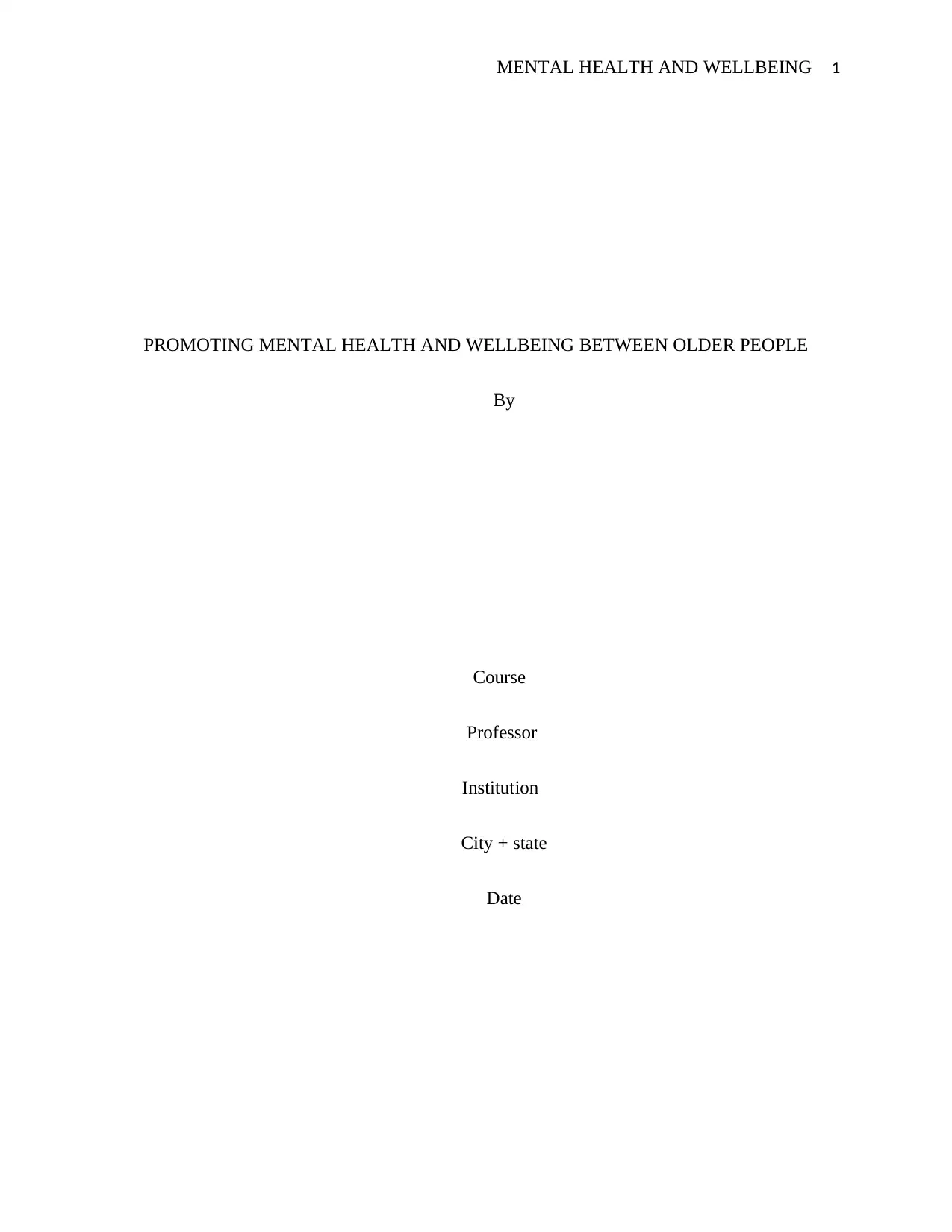
MENTAL HEALTH AND WELLBEING 1
PROMOTING MENTAL HEALTH AND WELLBEING BETWEEN OLDER PEOPLE
By
Course
Professor
Institution
City + state
Date
PROMOTING MENTAL HEALTH AND WELLBEING BETWEEN OLDER PEOPLE
By
Course
Professor
Institution
City + state
Date
Paraphrase This Document
Need a fresh take? Get an instant paraphrase of this document with our AI Paraphraser
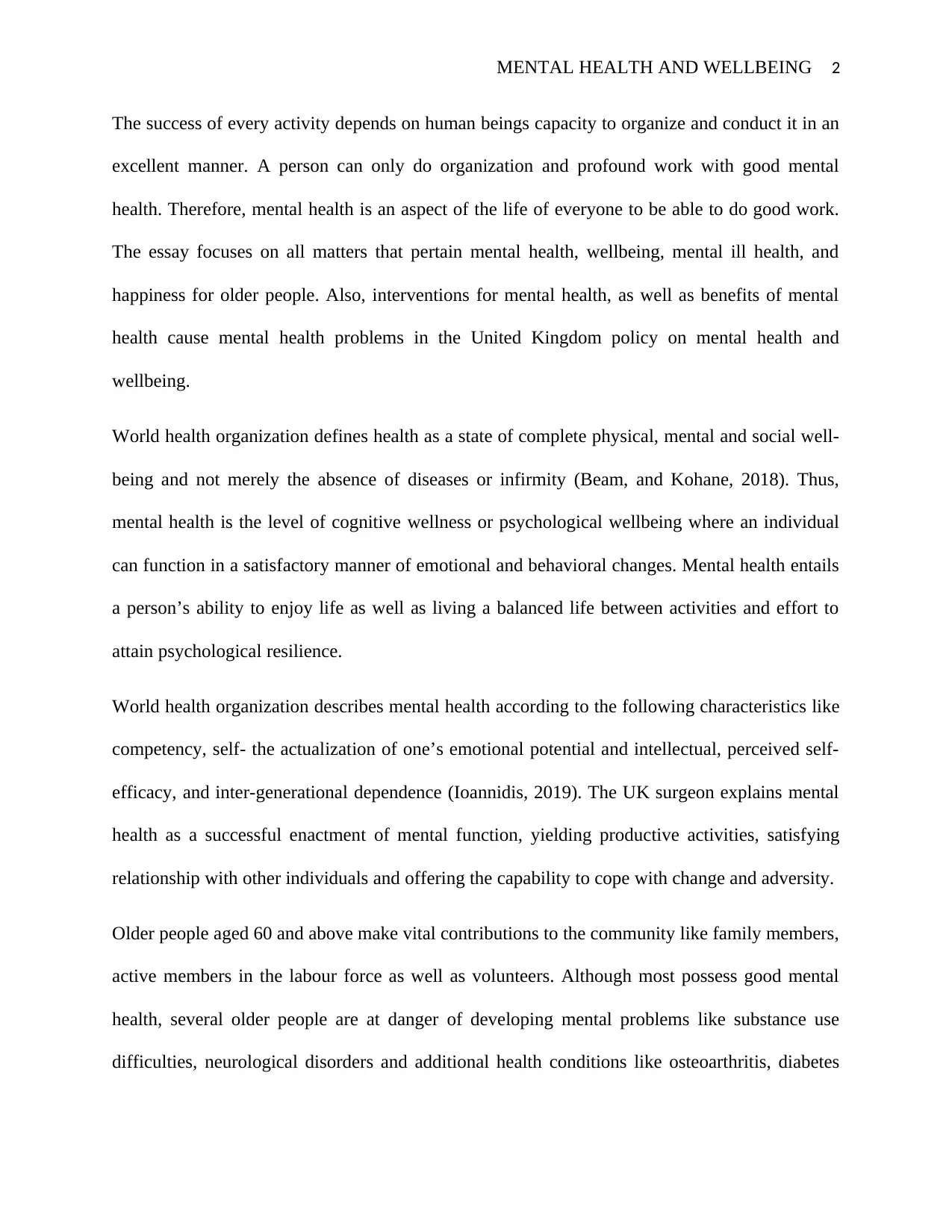
MENTAL HEALTH AND WELLBEING 2
The success of every activity depends on human beings capacity to organize and conduct it in an
excellent manner. A person can only do organization and profound work with good mental
health. Therefore, mental health is an aspect of the life of everyone to be able to do good work.
The essay focuses on all matters that pertain mental health, wellbeing, mental ill health, and
happiness for older people. Also, interventions for mental health, as well as benefits of mental
health cause mental health problems in the United Kingdom policy on mental health and
wellbeing.
World health organization defines health as a state of complete physical, mental and social well-
being and not merely the absence of diseases or infirmity (Beam, and Kohane, 2018). Thus,
mental health is the level of cognitive wellness or psychological wellbeing where an individual
can function in a satisfactory manner of emotional and behavioral changes. Mental health entails
a person’s ability to enjoy life as well as living a balanced life between activities and effort to
attain psychological resilience.
World health organization describes mental health according to the following characteristics like
competency, self- the actualization of one’s emotional potential and intellectual, perceived self-
efficacy, and inter-generational dependence (Ioannidis, 2019). The UK surgeon explains mental
health as a successful enactment of mental function, yielding productive activities, satisfying
relationship with other individuals and offering the capability to cope with change and adversity.
Older people aged 60 and above make vital contributions to the community like family members,
active members in the labour force as well as volunteers. Although most possess good mental
health, several older people are at danger of developing mental problems like substance use
difficulties, neurological disorders and additional health conditions like osteoarthritis, diabetes
The success of every activity depends on human beings capacity to organize and conduct it in an
excellent manner. A person can only do organization and profound work with good mental
health. Therefore, mental health is an aspect of the life of everyone to be able to do good work.
The essay focuses on all matters that pertain mental health, wellbeing, mental ill health, and
happiness for older people. Also, interventions for mental health, as well as benefits of mental
health cause mental health problems in the United Kingdom policy on mental health and
wellbeing.
World health organization defines health as a state of complete physical, mental and social well-
being and not merely the absence of diseases or infirmity (Beam, and Kohane, 2018). Thus,
mental health is the level of cognitive wellness or psychological wellbeing where an individual
can function in a satisfactory manner of emotional and behavioral changes. Mental health entails
a person’s ability to enjoy life as well as living a balanced life between activities and effort to
attain psychological resilience.
World health organization describes mental health according to the following characteristics like
competency, self- the actualization of one’s emotional potential and intellectual, perceived self-
efficacy, and inter-generational dependence (Ioannidis, 2019). The UK surgeon explains mental
health as a successful enactment of mental function, yielding productive activities, satisfying
relationship with other individuals and offering the capability to cope with change and adversity.
Older people aged 60 and above make vital contributions to the community like family members,
active members in the labour force as well as volunteers. Although most possess good mental
health, several older people are at danger of developing mental problems like substance use
difficulties, neurological disorders and additional health conditions like osteoarthritis, diabetes
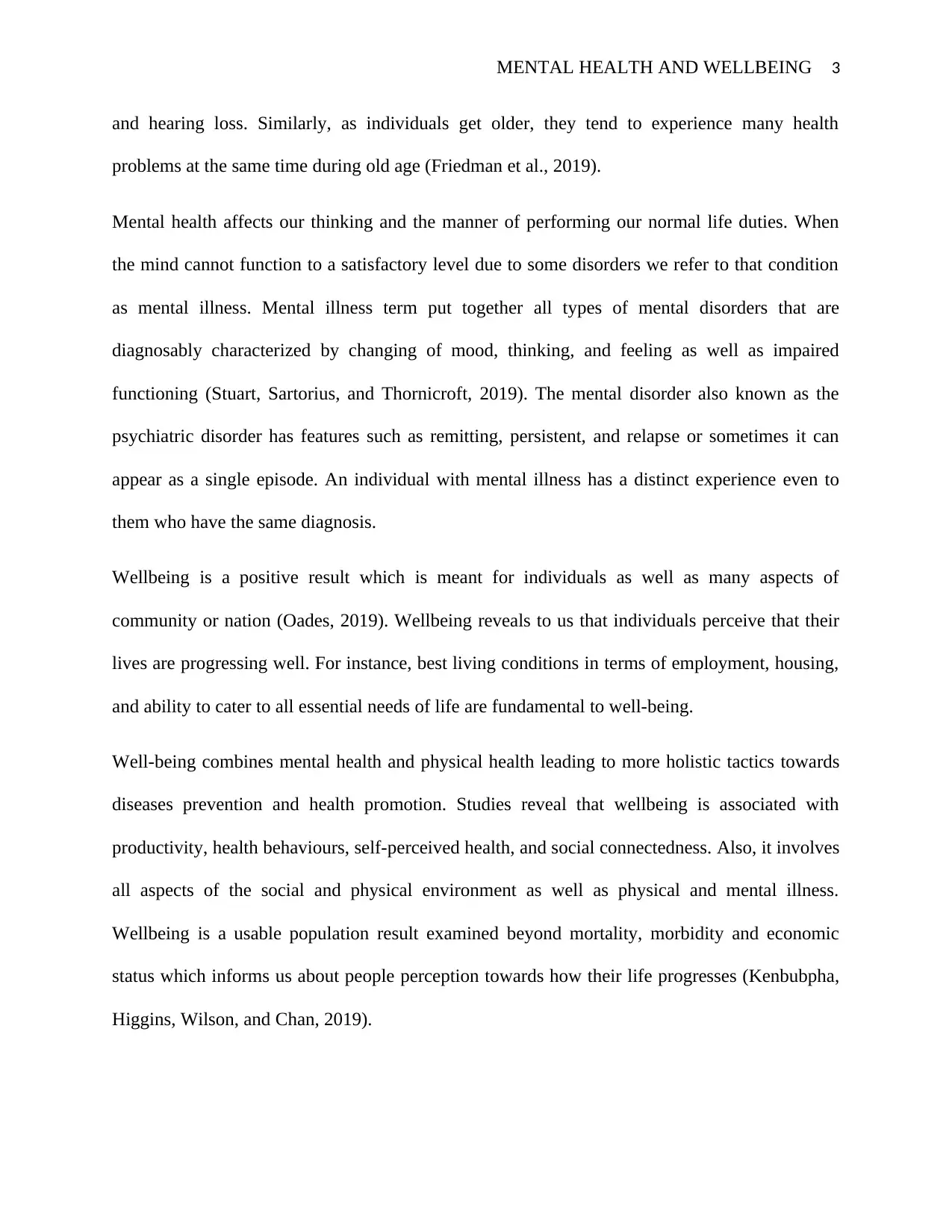
MENTAL HEALTH AND WELLBEING 3
and hearing loss. Similarly, as individuals get older, they tend to experience many health
problems at the same time during old age (Friedman et al., 2019).
Mental health affects our thinking and the manner of performing our normal life duties. When
the mind cannot function to a satisfactory level due to some disorders we refer to that condition
as mental illness. Mental illness term put together all types of mental disorders that are
diagnosably characterized by changing of mood, thinking, and feeling as well as impaired
functioning (Stuart, Sartorius, and Thornicroft, 2019). The mental disorder also known as the
psychiatric disorder has features such as remitting, persistent, and relapse or sometimes it can
appear as a single episode. An individual with mental illness has a distinct experience even to
them who have the same diagnosis.
Wellbeing is a positive result which is meant for individuals as well as many aspects of
community or nation (Oades, 2019). Wellbeing reveals to us that individuals perceive that their
lives are progressing well. For instance, best living conditions in terms of employment, housing,
and ability to cater to all essential needs of life are fundamental to well-being.
Well-being combines mental health and physical health leading to more holistic tactics towards
diseases prevention and health promotion. Studies reveal that wellbeing is associated with
productivity, health behaviours, self-perceived health, and social connectedness. Also, it involves
all aspects of the social and physical environment as well as physical and mental illness.
Wellbeing is a usable population result examined beyond mortality, morbidity and economic
status which informs us about people perception towards how their life progresses (Kenbubpha,
Higgins, Wilson, and Chan, 2019).
and hearing loss. Similarly, as individuals get older, they tend to experience many health
problems at the same time during old age (Friedman et al., 2019).
Mental health affects our thinking and the manner of performing our normal life duties. When
the mind cannot function to a satisfactory level due to some disorders we refer to that condition
as mental illness. Mental illness term put together all types of mental disorders that are
diagnosably characterized by changing of mood, thinking, and feeling as well as impaired
functioning (Stuart, Sartorius, and Thornicroft, 2019). The mental disorder also known as the
psychiatric disorder has features such as remitting, persistent, and relapse or sometimes it can
appear as a single episode. An individual with mental illness has a distinct experience even to
them who have the same diagnosis.
Wellbeing is a positive result which is meant for individuals as well as many aspects of
community or nation (Oades, 2019). Wellbeing reveals to us that individuals perceive that their
lives are progressing well. For instance, best living conditions in terms of employment, housing,
and ability to cater to all essential needs of life are fundamental to well-being.
Well-being combines mental health and physical health leading to more holistic tactics towards
diseases prevention and health promotion. Studies reveal that wellbeing is associated with
productivity, health behaviours, self-perceived health, and social connectedness. Also, it involves
all aspects of the social and physical environment as well as physical and mental illness.
Wellbeing is a usable population result examined beyond mortality, morbidity and economic
status which informs us about people perception towards how their life progresses (Kenbubpha,
Higgins, Wilson, and Chan, 2019).
⊘ This is a preview!⊘
Do you want full access?
Subscribe today to unlock all pages.

Trusted by 1+ million students worldwide
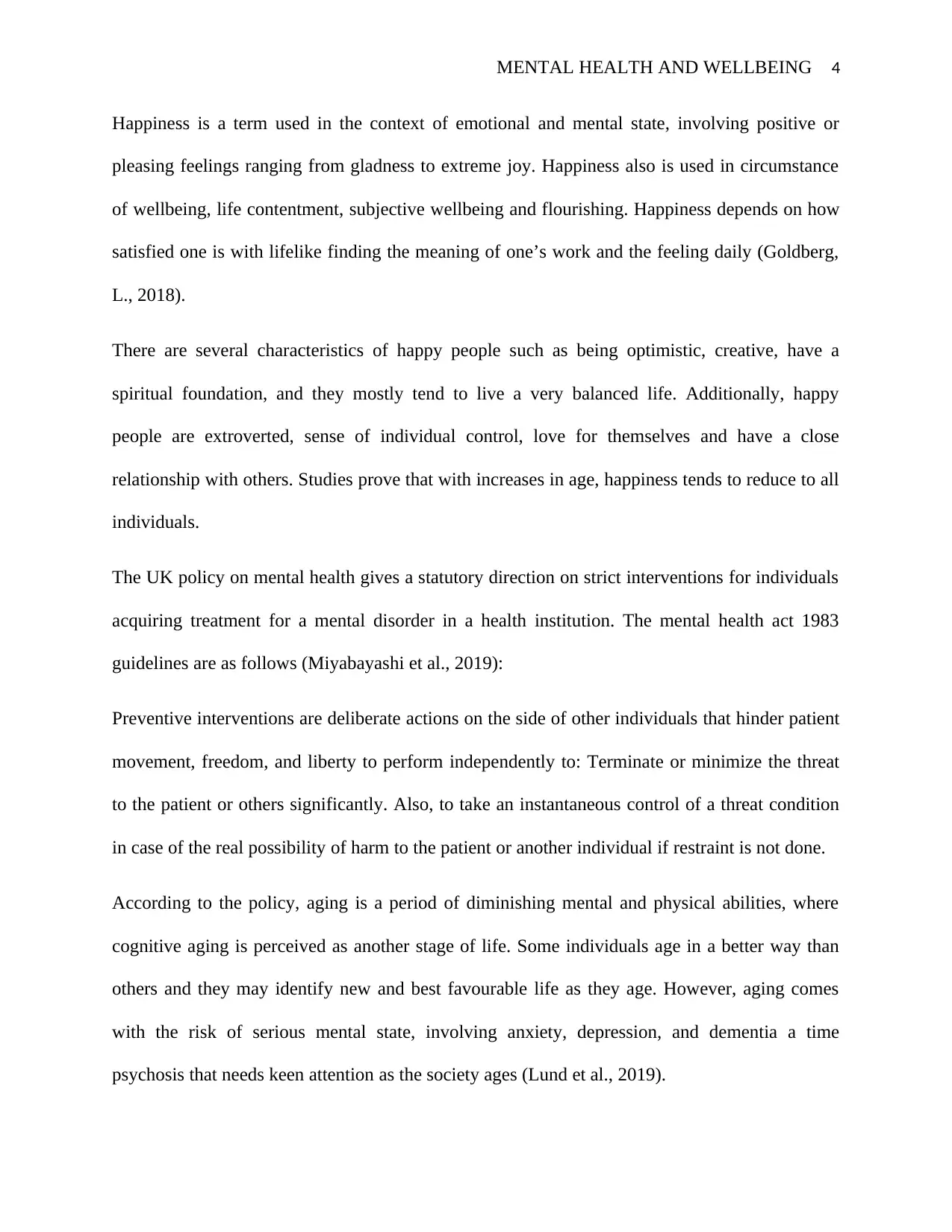
MENTAL HEALTH AND WELLBEING 4
Happiness is a term used in the context of emotional and mental state, involving positive or
pleasing feelings ranging from gladness to extreme joy. Happiness also is used in circumstance
of wellbeing, life contentment, subjective wellbeing and flourishing. Happiness depends on how
satisfied one is with lifelike finding the meaning of one’s work and the feeling daily (Goldberg,
L., 2018).
There are several characteristics of happy people such as being optimistic, creative, have a
spiritual foundation, and they mostly tend to live a very balanced life. Additionally, happy
people are extroverted, sense of individual control, love for themselves and have a close
relationship with others. Studies prove that with increases in age, happiness tends to reduce to all
individuals.
The UK policy on mental health gives a statutory direction on strict interventions for individuals
acquiring treatment for a mental disorder in a health institution. The mental health act 1983
guidelines are as follows (Miyabayashi et al., 2019):
Preventive interventions are deliberate actions on the side of other individuals that hinder patient
movement, freedom, and liberty to perform independently to: Terminate or minimize the threat
to the patient or others significantly. Also, to take an instantaneous control of a threat condition
in case of the real possibility of harm to the patient or another individual if restraint is not done.
According to the policy, aging is a period of diminishing mental and physical abilities, where
cognitive aging is perceived as another stage of life. Some individuals age in a better way than
others and they may identify new and best favourable life as they age. However, aging comes
with the risk of serious mental state, involving anxiety, depression, and dementia a time
psychosis that needs keen attention as the society ages (Lund et al., 2019).
Happiness is a term used in the context of emotional and mental state, involving positive or
pleasing feelings ranging from gladness to extreme joy. Happiness also is used in circumstance
of wellbeing, life contentment, subjective wellbeing and flourishing. Happiness depends on how
satisfied one is with lifelike finding the meaning of one’s work and the feeling daily (Goldberg,
L., 2018).
There are several characteristics of happy people such as being optimistic, creative, have a
spiritual foundation, and they mostly tend to live a very balanced life. Additionally, happy
people are extroverted, sense of individual control, love for themselves and have a close
relationship with others. Studies prove that with increases in age, happiness tends to reduce to all
individuals.
The UK policy on mental health gives a statutory direction on strict interventions for individuals
acquiring treatment for a mental disorder in a health institution. The mental health act 1983
guidelines are as follows (Miyabayashi et al., 2019):
Preventive interventions are deliberate actions on the side of other individuals that hinder patient
movement, freedom, and liberty to perform independently to: Terminate or minimize the threat
to the patient or others significantly. Also, to take an instantaneous control of a threat condition
in case of the real possibility of harm to the patient or another individual if restraint is not done.
According to the policy, aging is a period of diminishing mental and physical abilities, where
cognitive aging is perceived as another stage of life. Some individuals age in a better way than
others and they may identify new and best favourable life as they age. However, aging comes
with the risk of serious mental state, involving anxiety, depression, and dementia a time
psychosis that needs keen attention as the society ages (Lund et al., 2019).
Paraphrase This Document
Need a fresh take? Get an instant paraphrase of this document with our AI Paraphraser
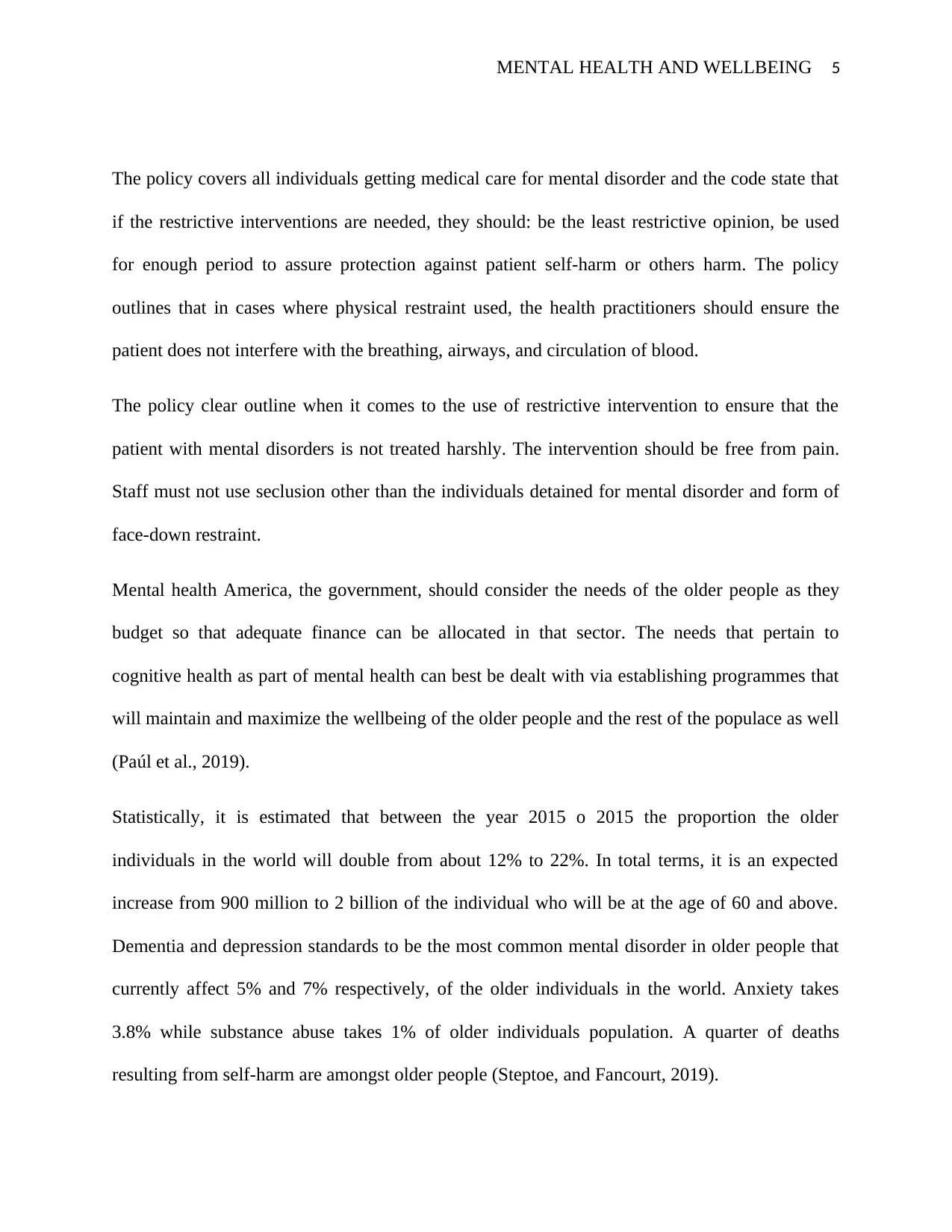
MENTAL HEALTH AND WELLBEING 5
The policy covers all individuals getting medical care for mental disorder and the code state that
if the restrictive interventions are needed, they should: be the least restrictive opinion, be used
for enough period to assure protection against patient self-harm or others harm. The policy
outlines that in cases where physical restraint used, the health practitioners should ensure the
patient does not interfere with the breathing, airways, and circulation of blood.
The policy clear outline when it comes to the use of restrictive intervention to ensure that the
patient with mental disorders is not treated harshly. The intervention should be free from pain.
Staff must not use seclusion other than the individuals detained for mental disorder and form of
face-down restraint.
Mental health America, the government, should consider the needs of the older people as they
budget so that adequate finance can be allocated in that sector. The needs that pertain to
cognitive health as part of mental health can best be dealt with via establishing programmes that
will maintain and maximize the wellbeing of the older people and the rest of the populace as well
(Paúl et al., 2019).
Statistically, it is estimated that between the year 2015 o 2015 the proportion the older
individuals in the world will double from about 12% to 22%. In total terms, it is an expected
increase from 900 million to 2 billion of the individual who will be at the age of 60 and above.
Dementia and depression standards to be the most common mental disorder in older people that
currently affect 5% and 7% respectively, of the older individuals in the world. Anxiety takes
3.8% while substance abuse takes 1% of older individuals population. A quarter of deaths
resulting from self-harm are amongst older people (Steptoe, and Fancourt, 2019).
The policy covers all individuals getting medical care for mental disorder and the code state that
if the restrictive interventions are needed, they should: be the least restrictive opinion, be used
for enough period to assure protection against patient self-harm or others harm. The policy
outlines that in cases where physical restraint used, the health practitioners should ensure the
patient does not interfere with the breathing, airways, and circulation of blood.
The policy clear outline when it comes to the use of restrictive intervention to ensure that the
patient with mental disorders is not treated harshly. The intervention should be free from pain.
Staff must not use seclusion other than the individuals detained for mental disorder and form of
face-down restraint.
Mental health America, the government, should consider the needs of the older people as they
budget so that adequate finance can be allocated in that sector. The needs that pertain to
cognitive health as part of mental health can best be dealt with via establishing programmes that
will maintain and maximize the wellbeing of the older people and the rest of the populace as well
(Paúl et al., 2019).
Statistically, it is estimated that between the year 2015 o 2015 the proportion the older
individuals in the world will double from about 12% to 22%. In total terms, it is an expected
increase from 900 million to 2 billion of the individual who will be at the age of 60 and above.
Dementia and depression standards to be the most common mental disorder in older people that
currently affect 5% and 7% respectively, of the older individuals in the world. Anxiety takes
3.8% while substance abuse takes 1% of older individuals population. A quarter of deaths
resulting from self-harm are amongst older people (Steptoe, and Fancourt, 2019).
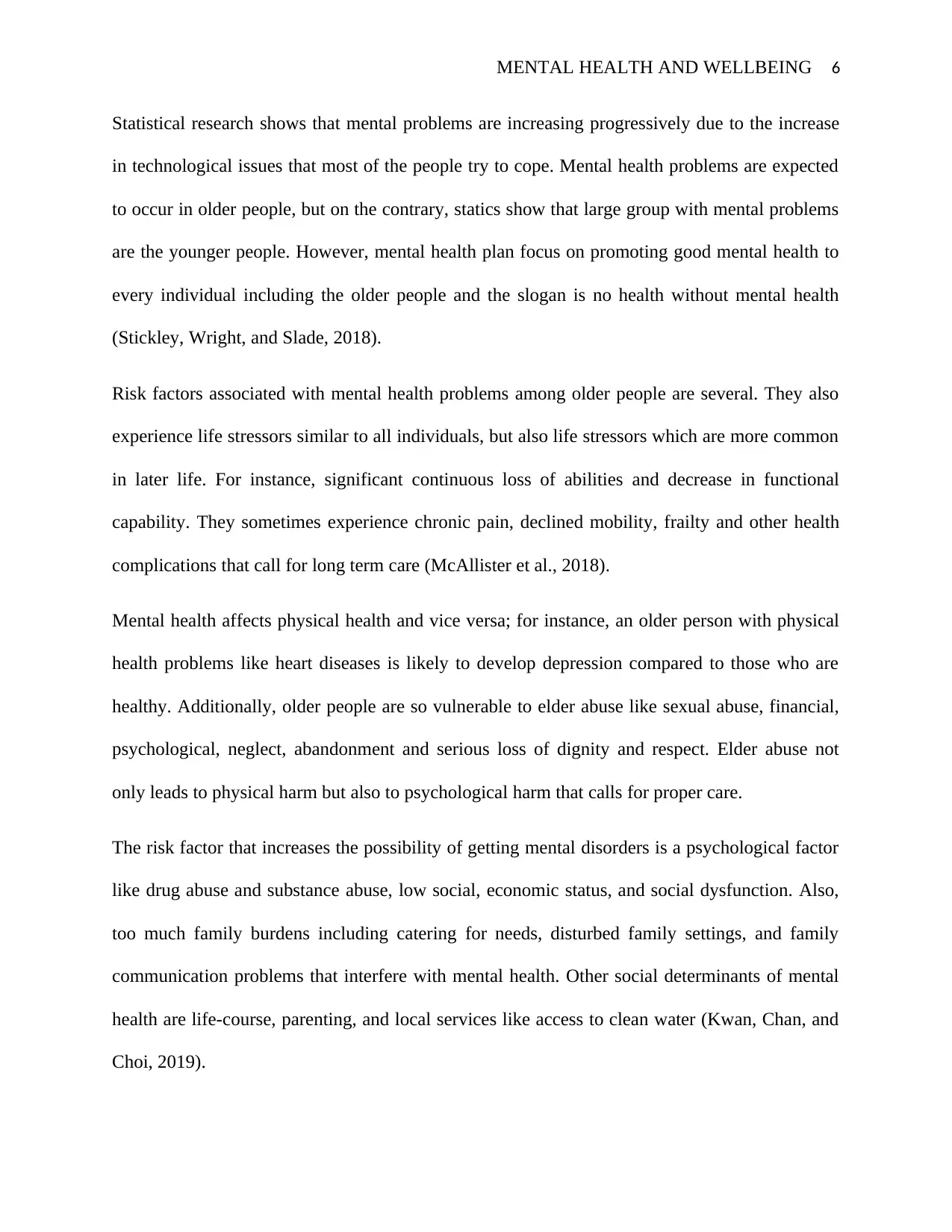
MENTAL HEALTH AND WELLBEING 6
Statistical research shows that mental problems are increasing progressively due to the increase
in technological issues that most of the people try to cope. Mental health problems are expected
to occur in older people, but on the contrary, statics show that large group with mental problems
are the younger people. However, mental health plan focus on promoting good mental health to
every individual including the older people and the slogan is no health without mental health
(Stickley, Wright, and Slade, 2018).
Risk factors associated with mental health problems among older people are several. They also
experience life stressors similar to all individuals, but also life stressors which are more common
in later life. For instance, significant continuous loss of abilities and decrease in functional
capability. They sometimes experience chronic pain, declined mobility, frailty and other health
complications that call for long term care (McAllister et al., 2018).
Mental health affects physical health and vice versa; for instance, an older person with physical
health problems like heart diseases is likely to develop depression compared to those who are
healthy. Additionally, older people are so vulnerable to elder abuse like sexual abuse, financial,
psychological, neglect, abandonment and serious loss of dignity and respect. Elder abuse not
only leads to physical harm but also to psychological harm that calls for proper care.
The risk factor that increases the possibility of getting mental disorders is a psychological factor
like drug abuse and substance abuse, low social, economic status, and social dysfunction. Also,
too much family burdens including catering for needs, disturbed family settings, and family
communication problems that interfere with mental health. Other social determinants of mental
health are life-course, parenting, and local services like access to clean water (Kwan, Chan, and
Choi, 2019).
Statistical research shows that mental problems are increasing progressively due to the increase
in technological issues that most of the people try to cope. Mental health problems are expected
to occur in older people, but on the contrary, statics show that large group with mental problems
are the younger people. However, mental health plan focus on promoting good mental health to
every individual including the older people and the slogan is no health without mental health
(Stickley, Wright, and Slade, 2018).
Risk factors associated with mental health problems among older people are several. They also
experience life stressors similar to all individuals, but also life stressors which are more common
in later life. For instance, significant continuous loss of abilities and decrease in functional
capability. They sometimes experience chronic pain, declined mobility, frailty and other health
complications that call for long term care (McAllister et al., 2018).
Mental health affects physical health and vice versa; for instance, an older person with physical
health problems like heart diseases is likely to develop depression compared to those who are
healthy. Additionally, older people are so vulnerable to elder abuse like sexual abuse, financial,
psychological, neglect, abandonment and serious loss of dignity and respect. Elder abuse not
only leads to physical harm but also to psychological harm that calls for proper care.
The risk factor that increases the possibility of getting mental disorders is a psychological factor
like drug abuse and substance abuse, low social, economic status, and social dysfunction. Also,
too much family burdens including catering for needs, disturbed family settings, and family
communication problems that interfere with mental health. Other social determinants of mental
health are life-course, parenting, and local services like access to clean water (Kwan, Chan, and
Choi, 2019).
⊘ This is a preview!⊘
Do you want full access?
Subscribe today to unlock all pages.

Trusted by 1+ million students worldwide
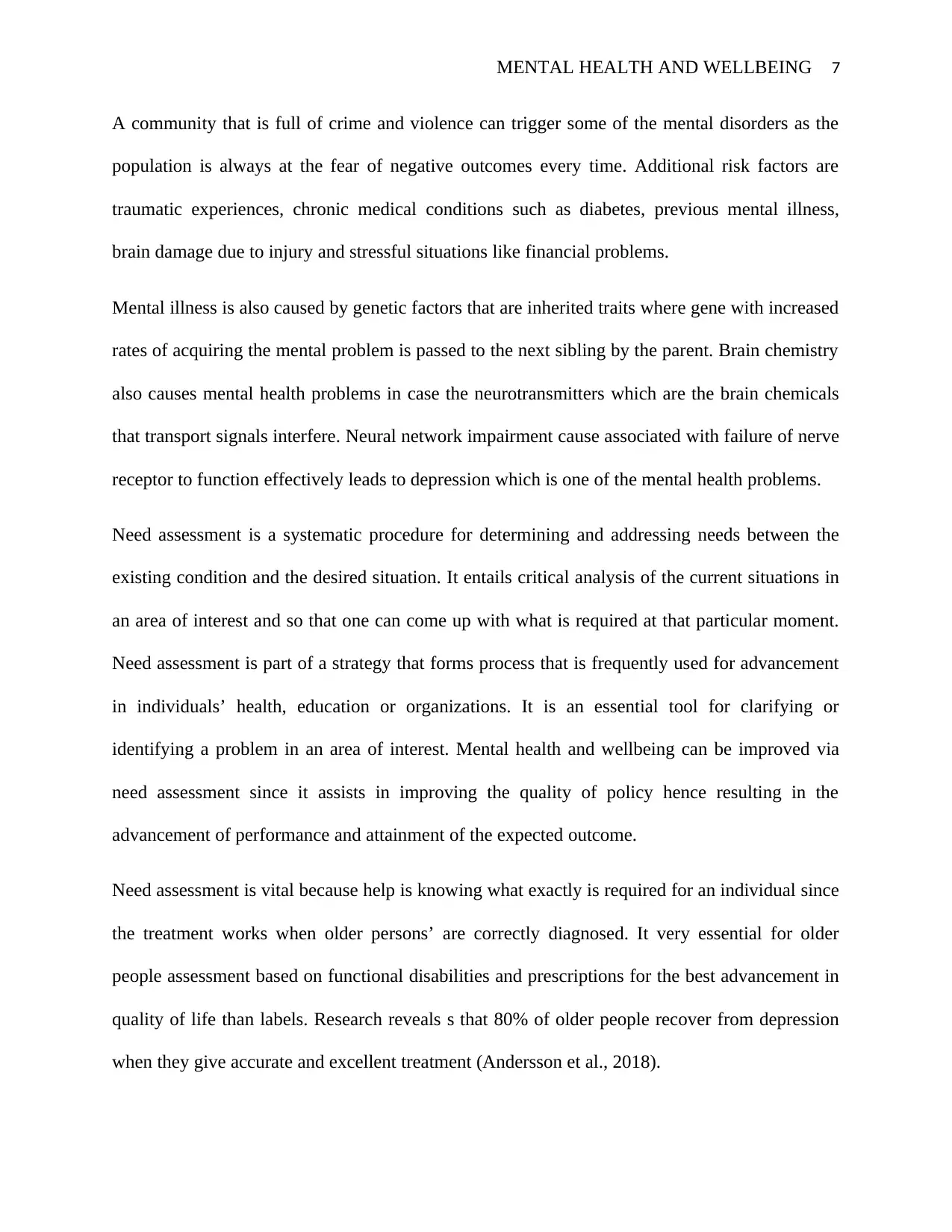
MENTAL HEALTH AND WELLBEING 7
A community that is full of crime and violence can trigger some of the mental disorders as the
population is always at the fear of negative outcomes every time. Additional risk factors are
traumatic experiences, chronic medical conditions such as diabetes, previous mental illness,
brain damage due to injury and stressful situations like financial problems.
Mental illness is also caused by genetic factors that are inherited traits where gene with increased
rates of acquiring the mental problem is passed to the next sibling by the parent. Brain chemistry
also causes mental health problems in case the neurotransmitters which are the brain chemicals
that transport signals interfere. Neural network impairment cause associated with failure of nerve
receptor to function effectively leads to depression which is one of the mental health problems.
Need assessment is a systematic procedure for determining and addressing needs between the
existing condition and the desired situation. It entails critical analysis of the current situations in
an area of interest and so that one can come up with what is required at that particular moment.
Need assessment is part of a strategy that forms process that is frequently used for advancement
in individuals’ health, education or organizations. It is an essential tool for clarifying or
identifying a problem in an area of interest. Mental health and wellbeing can be improved via
need assessment since it assists in improving the quality of policy hence resulting in the
advancement of performance and attainment of the expected outcome.
Need assessment is vital because help is knowing what exactly is required for an individual since
the treatment works when older persons’ are correctly diagnosed. It very essential for older
people assessment based on functional disabilities and prescriptions for the best advancement in
quality of life than labels. Research reveals s that 80% of older people recover from depression
when they give accurate and excellent treatment (Andersson et al., 2018).
A community that is full of crime and violence can trigger some of the mental disorders as the
population is always at the fear of negative outcomes every time. Additional risk factors are
traumatic experiences, chronic medical conditions such as diabetes, previous mental illness,
brain damage due to injury and stressful situations like financial problems.
Mental illness is also caused by genetic factors that are inherited traits where gene with increased
rates of acquiring the mental problem is passed to the next sibling by the parent. Brain chemistry
also causes mental health problems in case the neurotransmitters which are the brain chemicals
that transport signals interfere. Neural network impairment cause associated with failure of nerve
receptor to function effectively leads to depression which is one of the mental health problems.
Need assessment is a systematic procedure for determining and addressing needs between the
existing condition and the desired situation. It entails critical analysis of the current situations in
an area of interest and so that one can come up with what is required at that particular moment.
Need assessment is part of a strategy that forms process that is frequently used for advancement
in individuals’ health, education or organizations. It is an essential tool for clarifying or
identifying a problem in an area of interest. Mental health and wellbeing can be improved via
need assessment since it assists in improving the quality of policy hence resulting in the
advancement of performance and attainment of the expected outcome.
Need assessment is vital because help is knowing what exactly is required for an individual since
the treatment works when older persons’ are correctly diagnosed. It very essential for older
people assessment based on functional disabilities and prescriptions for the best advancement in
quality of life than labels. Research reveals s that 80% of older people recover from depression
when they give accurate and excellent treatment (Andersson et al., 2018).
Paraphrase This Document
Need a fresh take? Get an instant paraphrase of this document with our AI Paraphraser
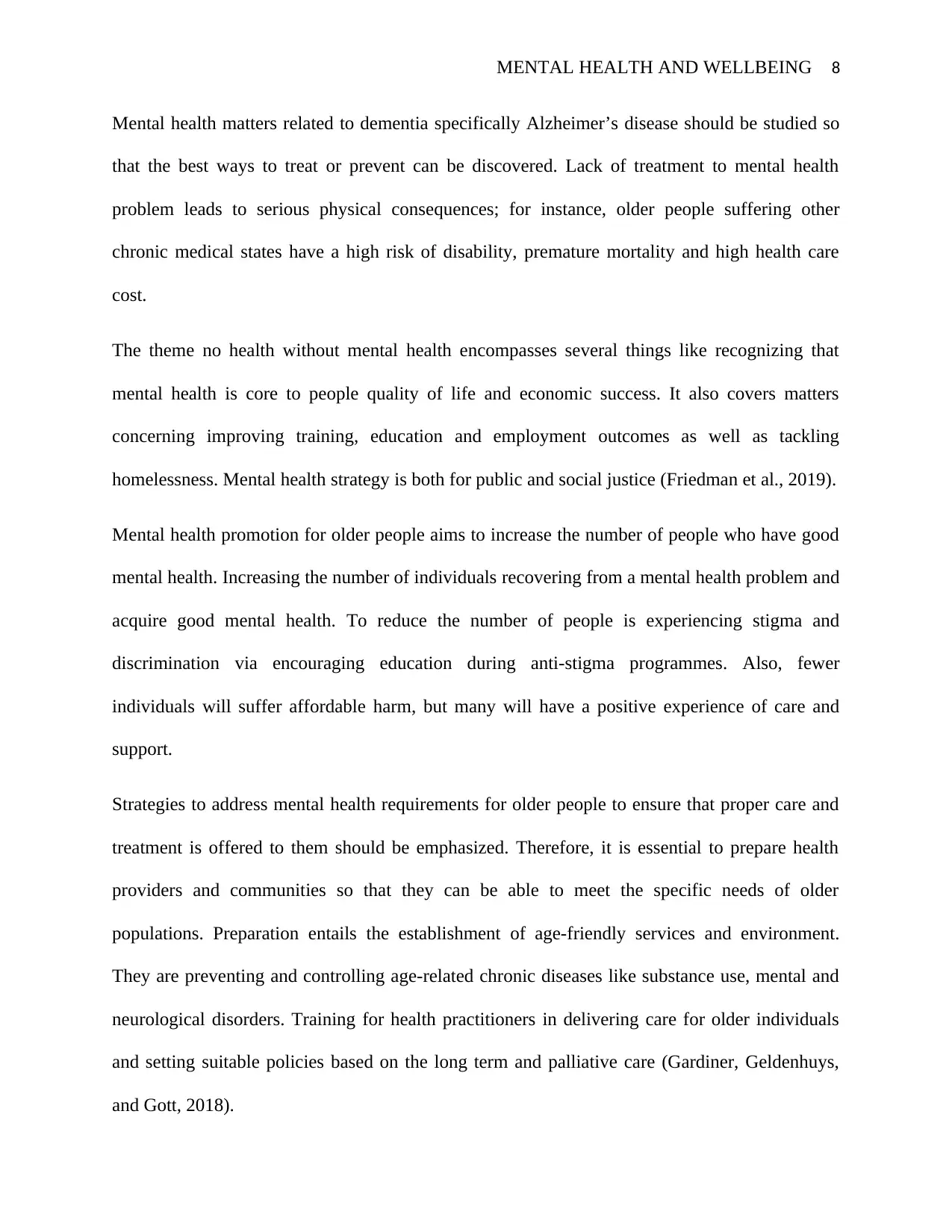
MENTAL HEALTH AND WELLBEING 8
Mental health matters related to dementia specifically Alzheimer’s disease should be studied so
that the best ways to treat or prevent can be discovered. Lack of treatment to mental health
problem leads to serious physical consequences; for instance, older people suffering other
chronic medical states have a high risk of disability, premature mortality and high health care
cost.
The theme no health without mental health encompasses several things like recognizing that
mental health is core to people quality of life and economic success. It also covers matters
concerning improving training, education and employment outcomes as well as tackling
homelessness. Mental health strategy is both for public and social justice (Friedman et al., 2019).
Mental health promotion for older people aims to increase the number of people who have good
mental health. Increasing the number of individuals recovering from a mental health problem and
acquire good mental health. To reduce the number of people is experiencing stigma and
discrimination via encouraging education during anti-stigma programmes. Also, fewer
individuals will suffer affordable harm, but many will have a positive experience of care and
support.
Strategies to address mental health requirements for older people to ensure that proper care and
treatment is offered to them should be emphasized. Therefore, it is essential to prepare health
providers and communities so that they can be able to meet the specific needs of older
populations. Preparation entails the establishment of age-friendly services and environment.
They are preventing and controlling age-related chronic diseases like substance use, mental and
neurological disorders. Training for health practitioners in delivering care for older individuals
and setting suitable policies based on the long term and palliative care (Gardiner, Geldenhuys,
and Gott, 2018).
Mental health matters related to dementia specifically Alzheimer’s disease should be studied so
that the best ways to treat or prevent can be discovered. Lack of treatment to mental health
problem leads to serious physical consequences; for instance, older people suffering other
chronic medical states have a high risk of disability, premature mortality and high health care
cost.
The theme no health without mental health encompasses several things like recognizing that
mental health is core to people quality of life and economic success. It also covers matters
concerning improving training, education and employment outcomes as well as tackling
homelessness. Mental health strategy is both for public and social justice (Friedman et al., 2019).
Mental health promotion for older people aims to increase the number of people who have good
mental health. Increasing the number of individuals recovering from a mental health problem and
acquire good mental health. To reduce the number of people is experiencing stigma and
discrimination via encouraging education during anti-stigma programmes. Also, fewer
individuals will suffer affordable harm, but many will have a positive experience of care and
support.
Strategies to address mental health requirements for older people to ensure that proper care and
treatment is offered to them should be emphasized. Therefore, it is essential to prepare health
providers and communities so that they can be able to meet the specific needs of older
populations. Preparation entails the establishment of age-friendly services and environment.
They are preventing and controlling age-related chronic diseases like substance use, mental and
neurological disorders. Training for health practitioners in delivering care for older individuals
and setting suitable policies based on the long term and palliative care (Gardiner, Geldenhuys,
and Gott, 2018).
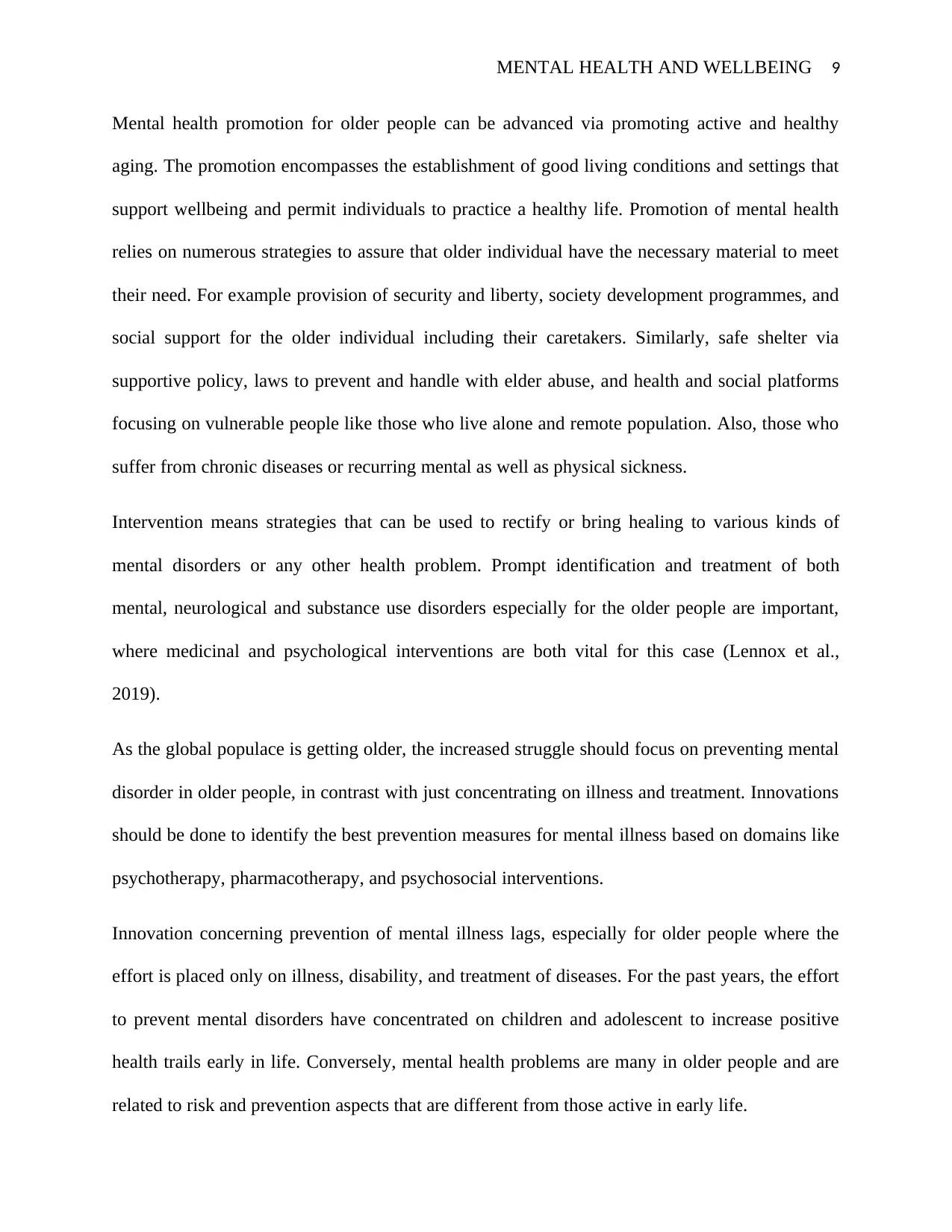
MENTAL HEALTH AND WELLBEING 9
Mental health promotion for older people can be advanced via promoting active and healthy
aging. The promotion encompasses the establishment of good living conditions and settings that
support wellbeing and permit individuals to practice a healthy life. Promotion of mental health
relies on numerous strategies to assure that older individual have the necessary material to meet
their need. For example provision of security and liberty, society development programmes, and
social support for the older individual including their caretakers. Similarly, safe shelter via
supportive policy, laws to prevent and handle with elder abuse, and health and social platforms
focusing on vulnerable people like those who live alone and remote population. Also, those who
suffer from chronic diseases or recurring mental as well as physical sickness.
Intervention means strategies that can be used to rectify or bring healing to various kinds of
mental disorders or any other health problem. Prompt identification and treatment of both
mental, neurological and substance use disorders especially for the older people are important,
where medicinal and psychological interventions are both vital for this case (Lennox et al.,
2019).
As the global populace is getting older, the increased struggle should focus on preventing mental
disorder in older people, in contrast with just concentrating on illness and treatment. Innovations
should be done to identify the best prevention measures for mental illness based on domains like
psychotherapy, pharmacotherapy, and psychosocial interventions.
Innovation concerning prevention of mental illness lags, especially for older people where the
effort is placed only on illness, disability, and treatment of diseases. For the past years, the effort
to prevent mental disorders have concentrated on children and adolescent to increase positive
health trails early in life. Conversely, mental health problems are many in older people and are
related to risk and prevention aspects that are different from those active in early life.
Mental health promotion for older people can be advanced via promoting active and healthy
aging. The promotion encompasses the establishment of good living conditions and settings that
support wellbeing and permit individuals to practice a healthy life. Promotion of mental health
relies on numerous strategies to assure that older individual have the necessary material to meet
their need. For example provision of security and liberty, society development programmes, and
social support for the older individual including their caretakers. Similarly, safe shelter via
supportive policy, laws to prevent and handle with elder abuse, and health and social platforms
focusing on vulnerable people like those who live alone and remote population. Also, those who
suffer from chronic diseases or recurring mental as well as physical sickness.
Intervention means strategies that can be used to rectify or bring healing to various kinds of
mental disorders or any other health problem. Prompt identification and treatment of both
mental, neurological and substance use disorders especially for the older people are important,
where medicinal and psychological interventions are both vital for this case (Lennox et al.,
2019).
As the global populace is getting older, the increased struggle should focus on preventing mental
disorder in older people, in contrast with just concentrating on illness and treatment. Innovations
should be done to identify the best prevention measures for mental illness based on domains like
psychotherapy, pharmacotherapy, and psychosocial interventions.
Innovation concerning prevention of mental illness lags, especially for older people where the
effort is placed only on illness, disability, and treatment of diseases. For the past years, the effort
to prevent mental disorders have concentrated on children and adolescent to increase positive
health trails early in life. Conversely, mental health problems are many in older people and are
related to risk and prevention aspects that are different from those active in early life.
⊘ This is a preview!⊘
Do you want full access?
Subscribe today to unlock all pages.

Trusted by 1+ million students worldwide
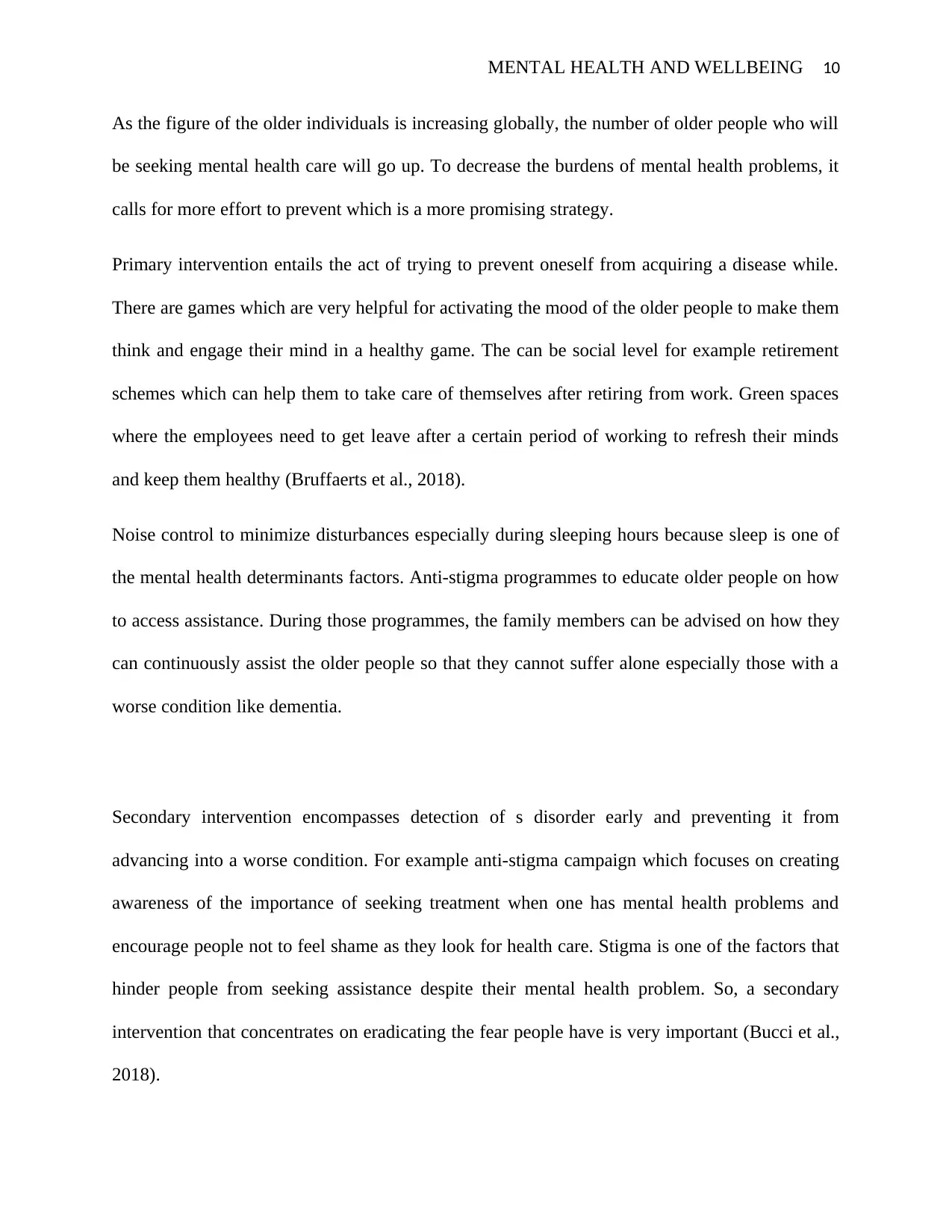
MENTAL HEALTH AND WELLBEING 10
As the figure of the older individuals is increasing globally, the number of older people who will
be seeking mental health care will go up. To decrease the burdens of mental health problems, it
calls for more effort to prevent which is a more promising strategy.
Primary intervention entails the act of trying to prevent oneself from acquiring a disease while.
There are games which are very helpful for activating the mood of the older people to make them
think and engage their mind in a healthy game. The can be social level for example retirement
schemes which can help them to take care of themselves after retiring from work. Green spaces
where the employees need to get leave after a certain period of working to refresh their minds
and keep them healthy (Bruffaerts et al., 2018).
Noise control to minimize disturbances especially during sleeping hours because sleep is one of
the mental health determinants factors. Anti-stigma programmes to educate older people on how
to access assistance. During those programmes, the family members can be advised on how they
can continuously assist the older people so that they cannot suffer alone especially those with a
worse condition like dementia.
Secondary intervention encompasses detection of s disorder early and preventing it from
advancing into a worse condition. For example anti-stigma campaign which focuses on creating
awareness of the importance of seeking treatment when one has mental health problems and
encourage people not to feel shame as they look for health care. Stigma is one of the factors that
hinder people from seeking assistance despite their mental health problem. So, a secondary
intervention that concentrates on eradicating the fear people have is very important (Bucci et al.,
2018).
As the figure of the older individuals is increasing globally, the number of older people who will
be seeking mental health care will go up. To decrease the burdens of mental health problems, it
calls for more effort to prevent which is a more promising strategy.
Primary intervention entails the act of trying to prevent oneself from acquiring a disease while.
There are games which are very helpful for activating the mood of the older people to make them
think and engage their mind in a healthy game. The can be social level for example retirement
schemes which can help them to take care of themselves after retiring from work. Green spaces
where the employees need to get leave after a certain period of working to refresh their minds
and keep them healthy (Bruffaerts et al., 2018).
Noise control to minimize disturbances especially during sleeping hours because sleep is one of
the mental health determinants factors. Anti-stigma programmes to educate older people on how
to access assistance. During those programmes, the family members can be advised on how they
can continuously assist the older people so that they cannot suffer alone especially those with a
worse condition like dementia.
Secondary intervention encompasses detection of s disorder early and preventing it from
advancing into a worse condition. For example anti-stigma campaign which focuses on creating
awareness of the importance of seeking treatment when one has mental health problems and
encourage people not to feel shame as they look for health care. Stigma is one of the factors that
hinder people from seeking assistance despite their mental health problem. So, a secondary
intervention that concentrates on eradicating the fear people have is very important (Bucci et al.,
2018).
Paraphrase This Document
Need a fresh take? Get an instant paraphrase of this document with our AI Paraphraser
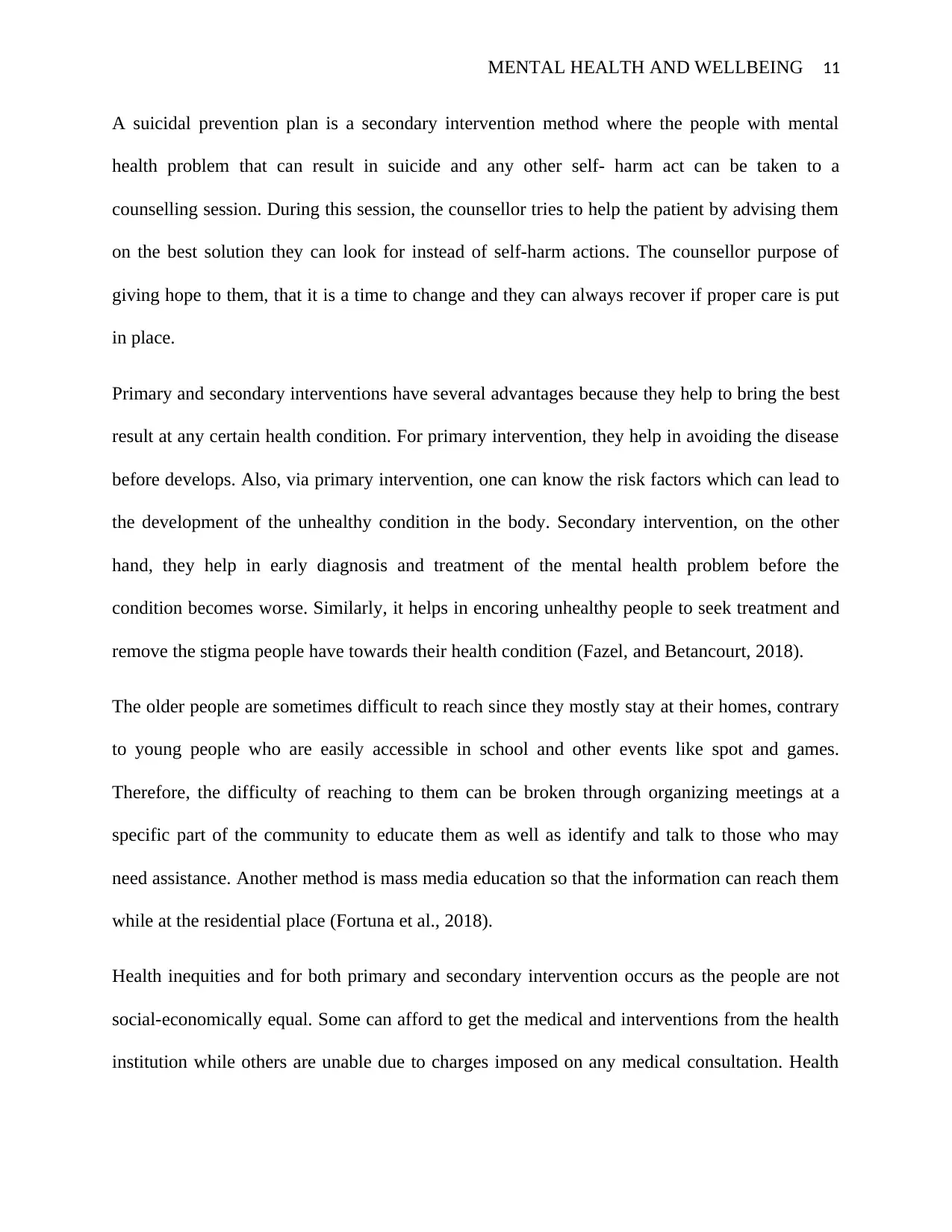
MENTAL HEALTH AND WELLBEING 11
A suicidal prevention plan is a secondary intervention method where the people with mental
health problem that can result in suicide and any other self- harm act can be taken to a
counselling session. During this session, the counsellor tries to help the patient by advising them
on the best solution they can look for instead of self-harm actions. The counsellor purpose of
giving hope to them, that it is a time to change and they can always recover if proper care is put
in place.
Primary and secondary interventions have several advantages because they help to bring the best
result at any certain health condition. For primary intervention, they help in avoiding the disease
before develops. Also, via primary intervention, one can know the risk factors which can lead to
the development of the unhealthy condition in the body. Secondary intervention, on the other
hand, they help in early diagnosis and treatment of the mental health problem before the
condition becomes worse. Similarly, it helps in encoring unhealthy people to seek treatment and
remove the stigma people have towards their health condition (Fazel, and Betancourt, 2018).
The older people are sometimes difficult to reach since they mostly stay at their homes, contrary
to young people who are easily accessible in school and other events like spot and games.
Therefore, the difficulty of reaching to them can be broken through organizing meetings at a
specific part of the community to educate them as well as identify and talk to those who may
need assistance. Another method is mass media education so that the information can reach them
while at the residential place (Fortuna et al., 2018).
Health inequities and for both primary and secondary intervention occurs as the people are not
social-economically equal. Some can afford to get the medical and interventions from the health
institution while others are unable due to charges imposed on any medical consultation. Health
A suicidal prevention plan is a secondary intervention method where the people with mental
health problem that can result in suicide and any other self- harm act can be taken to a
counselling session. During this session, the counsellor tries to help the patient by advising them
on the best solution they can look for instead of self-harm actions. The counsellor purpose of
giving hope to them, that it is a time to change and they can always recover if proper care is put
in place.
Primary and secondary interventions have several advantages because they help to bring the best
result at any certain health condition. For primary intervention, they help in avoiding the disease
before develops. Also, via primary intervention, one can know the risk factors which can lead to
the development of the unhealthy condition in the body. Secondary intervention, on the other
hand, they help in early diagnosis and treatment of the mental health problem before the
condition becomes worse. Similarly, it helps in encoring unhealthy people to seek treatment and
remove the stigma people have towards their health condition (Fazel, and Betancourt, 2018).
The older people are sometimes difficult to reach since they mostly stay at their homes, contrary
to young people who are easily accessible in school and other events like spot and games.
Therefore, the difficulty of reaching to them can be broken through organizing meetings at a
specific part of the community to educate them as well as identify and talk to those who may
need assistance. Another method is mass media education so that the information can reach them
while at the residential place (Fortuna et al., 2018).
Health inequities and for both primary and secondary intervention occurs as the people are not
social-economically equal. Some can afford to get the medical and interventions from the health
institution while others are unable due to charges imposed on any medical consultation. Health
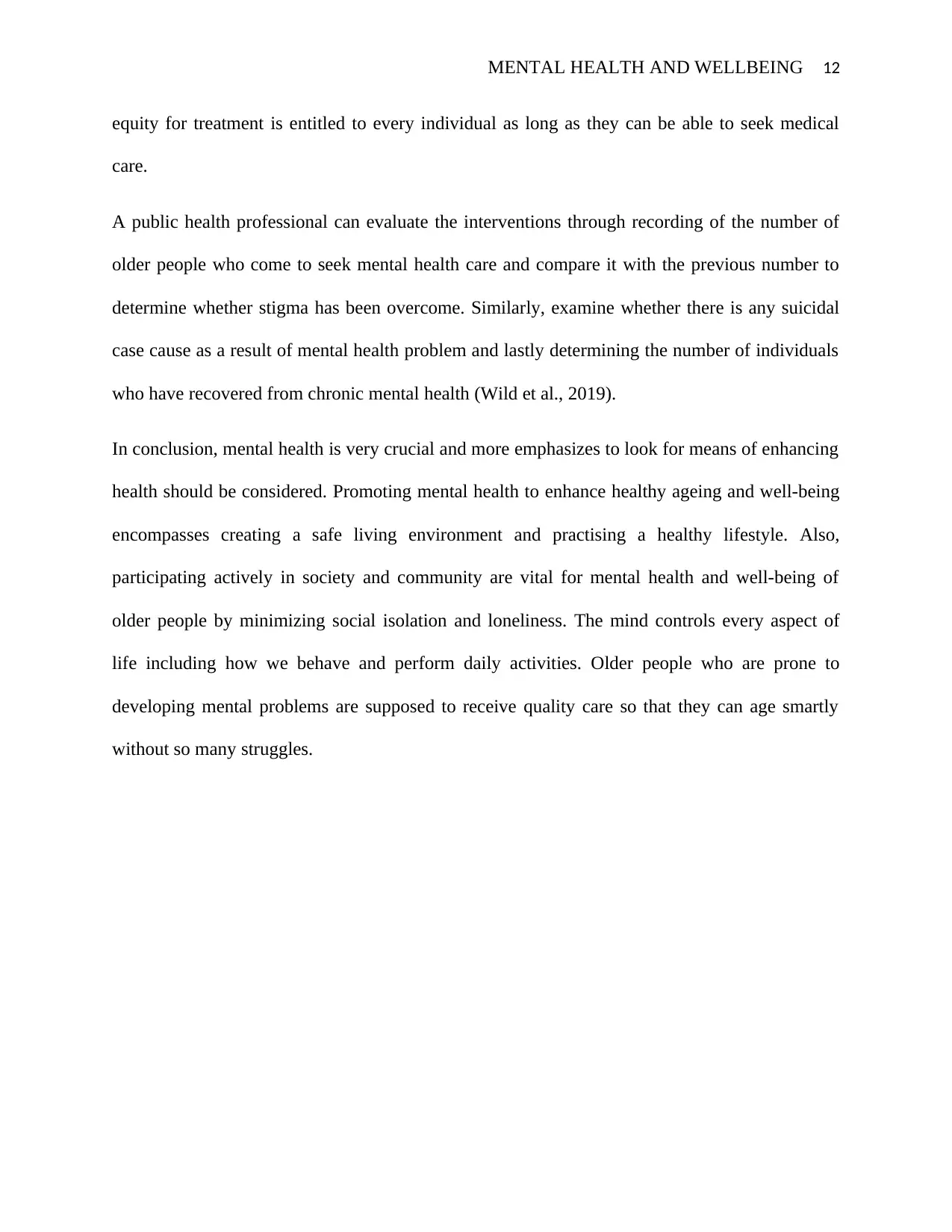
MENTAL HEALTH AND WELLBEING 12
equity for treatment is entitled to every individual as long as they can be able to seek medical
care.
A public health professional can evaluate the interventions through recording of the number of
older people who come to seek mental health care and compare it with the previous number to
determine whether stigma has been overcome. Similarly, examine whether there is any suicidal
case cause as a result of mental health problem and lastly determining the number of individuals
who have recovered from chronic mental health (Wild et al., 2019).
In conclusion, mental health is very crucial and more emphasizes to look for means of enhancing
health should be considered. Promoting mental health to enhance healthy ageing and well-being
encompasses creating a safe living environment and practising a healthy lifestyle. Also,
participating actively in society and community are vital for mental health and well-being of
older people by minimizing social isolation and loneliness. The mind controls every aspect of
life including how we behave and perform daily activities. Older people who are prone to
developing mental problems are supposed to receive quality care so that they can age smartly
without so many struggles.
equity for treatment is entitled to every individual as long as they can be able to seek medical
care.
A public health professional can evaluate the interventions through recording of the number of
older people who come to seek mental health care and compare it with the previous number to
determine whether stigma has been overcome. Similarly, examine whether there is any suicidal
case cause as a result of mental health problem and lastly determining the number of individuals
who have recovered from chronic mental health (Wild et al., 2019).
In conclusion, mental health is very crucial and more emphasizes to look for means of enhancing
health should be considered. Promoting mental health to enhance healthy ageing and well-being
encompasses creating a safe living environment and practising a healthy lifestyle. Also,
participating actively in society and community are vital for mental health and well-being of
older people by minimizing social isolation and loneliness. The mind controls every aspect of
life including how we behave and perform daily activities. Older people who are prone to
developing mental problems are supposed to receive quality care so that they can age smartly
without so many struggles.
⊘ This is a preview!⊘
Do you want full access?
Subscribe today to unlock all pages.

Trusted by 1+ million students worldwide
1 out of 16
Related Documents
Your All-in-One AI-Powered Toolkit for Academic Success.
+13062052269
info@desklib.com
Available 24*7 on WhatsApp / Email
![[object Object]](/_next/static/media/star-bottom.7253800d.svg)
Unlock your academic potential
Copyright © 2020–2026 A2Z Services. All Rights Reserved. Developed and managed by ZUCOL.




